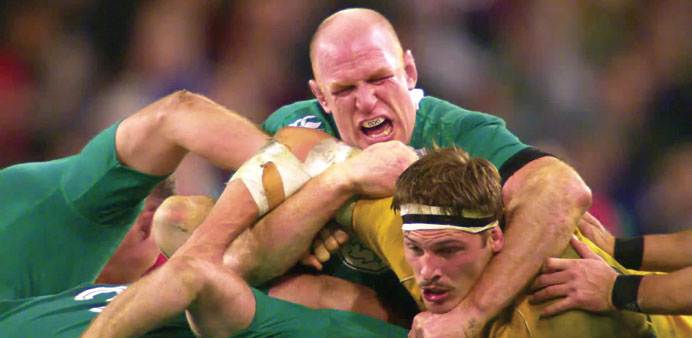AFP/Dublin
Few people would begrudge Paul O’Connell if the Irish colossus was to lift the World Cup trophy on October 31, such has been his contribution to the game.
The lock—who will turn 36 on October 20 and who for nigh on 13 years has been literally the engine room of the Irish pack—may lack the poster boy looks of iconic retired centre Brian O’Driscoll, but even women it seems would prefer to turn to the boy from Limerick than the one from the bright lights of supposedly more cultured and fashionable Dublin in the quest for World Cup glory.
O’Connell, despite the battered features and the former thick thatch of red hair having thinned to almost nothing, is the rugby man, past and present, who topped a poll this year of 1000 Irish women with 23 percent saying who they would most like to go to bed with—‘BOD’ came third with 17 percent.
A surprising finding perhaps none more so than to O’Connell who is happily married to his long-time love Emily—whom he married in Auch, France, in July 2013 — and with whom he has a four year-old-son Paddy and a daughter Lola born last November.
O’Connell, though, has always defied expectations.
His career started in that manner as, having developed a reputation as a top class swimmer, he decided that he would like a go at the rough and tumble of rugby instead having been mesmerised by Munster after jumping over the stadium wall to go and watch a game.
While O’Driscoll and his ‘glamour boys’ from Leinster played lively cavalier rugby pleasing to the eye, O’Connell drove a pack-oriented game for Munster, relying largely on Ronan O’Gara’s boot for points.
Ireland coach Joe Schmidt, who had no hesitation in choosing O’Connell as his skipper for the title-winning 2014 Six Nations side despite his injuries—various knee, groin and ankle problems had through the years caused him to miss many matches—and his age, sums up O’Connell’s class with a word from his homeland: ‘Mana’.
New Zealander Schmidt said back in November after seeing off the Springboks at Lansdowne Road that the word Mana—which means power, effectiveness and prestige in Austronesian languages—best sums up O’Connell.
“A guy who does not know how to give up. When he’s done, he delivers again. Not many have the mental capacity that Paul O’Connell has.
“There are a lot of guys who physically get into good shape, but he’s one of the most mentally tough players I’ve been involved with.
“I’m not sure myself how he does it.”
O’Connell’s importance to any side is such that when on his third British and Irish Lions tour, in 2013 to Australia, he was asked to stay on by the coach Warren Gatland even though he broke his arm in the first Test.
O’Driscoll bowed out after the memorable win over France in Paris to clinch the 2014 Six Nations crown—but for O’Connell the farewell could be even more glorious.
However, O’Connell knows all about performing below expectations as he experienced with the 2007 side who were regarded as World Cup dark horses and went out in the first round.
But he is also mindful of what winning the trophy can do for one.
“If you can lift the World Cup you will go down in history,” he said.
“Look at the English team that won it in 2003 — the only northern hemisphere nation to have ever done that.
“Those guys are legends. It would be great to fulfil our potential and play to the best of our ability in this year’s World Cup.”

Colossus: Paul O’Connell (top), Ireland’s engine room
